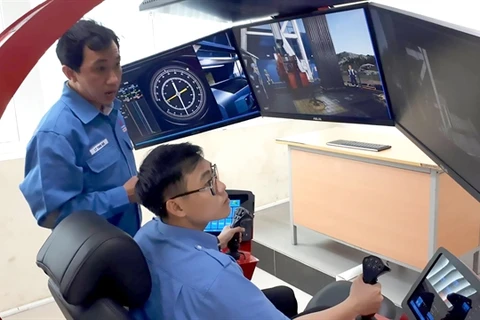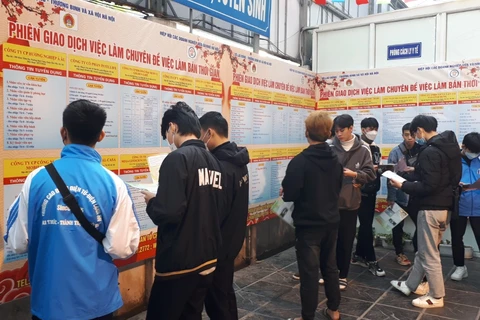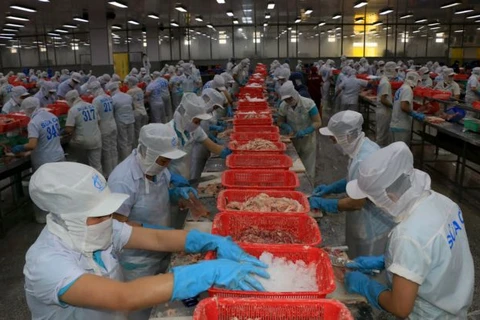Hanoi (VNS/VNA) - Employment service centres in big cities have increased capacity to help connect workers with vacancies after the Tet (Lunar New Year) holiday.
Nguyen Duc Hoang, an electrician in Hanoi, quit his job before the Tet holiday and has been doing a variety of part-time jobs since.
He has been receiving unemployment insurance for three months.
He went to the Hanoi Job Marketplace to find a more stable job with insurance and allowances.
“Through the job marketplace, I was introduced to several jobs related to my profession, and I’m considering them,” said Hoang.
Nguyen Thi Nhung, an accountant, also went to the Hanoi Job Marketplace to find out more information about recruitment after finishing an advanced professional course.
“I already got the information I needed, and I am comparing companies’ conditions and remuneration," she said.
Vu Quang Thanh, deputy director of the Hanoi Employment Service Centre, said that after the holiday, the Hanoi Job Marketplace re-opened on January 30.
Thematic job introduction sessions would be held regularly this month, with many sessions for young people.
He said that the labour market in Hanoi remained stable.
The centre would continue to collect information to assess the impact of businesses facing difficulties in the labour market. From there, it will organise thematic jobs and online sessions suitable for different people.
Last year, the centre held 262 job introduction sessions, through which 125,000 workers were consulted and provided with labour market information.
More than 55,000 workers were connected with enterprises and interviewed; over 19,500 workers found employment thanks to the sessions.
This year, Hanoi set a target of creating jobs for 162,000 workers, an increase of 2,000 people compared to last year.
Thanh said the centre would strive to implement the city's job creation plan.
Based on an assessment of the labour market, especially after the Tet holiday, the centre would improve the quality of job introduction sessions.
In Ho Chi Minh City, it is expected that in the first quarter of this year, there will be 11,550 new job positions for footwear, garment, manufacturing, processing, services, accounting and audit.
The HCM City Employment Service Centre said that after the Tet holiday, businesses would recruit many workers to develop production. This would be an opportunity for employees, especially students and graduates, to find jobs and workers who want to change jobs.
In the last months of last year, besides businesses affected by the COVID-19 pandemic and the global economic downturn, causing about 53,000 workers lost their jobs. However, other businesses still needed to recruit over 350,000 people, especially technical workers, according to the Ministry of Labour, Invalids and Social Affairs (MoLISA).
The MoLISA will review recruitment demand and enterprises’ trading situation, especially foreign direct investment (FDI) enterprises needing a lot of labour, such as garment, footwear and wood production.
In addition, job session frequency will be increased, prioritising online sessions and supporting workers with travel expenses when participating in job transactions.
Le Dinh Quang, deputy head of the Policy and Law Department under the Vietnam General Confederation of Labour, said that the current priority was maintaining a flexible and sustainable labour market.
"Workers who lost their jobs can look for jobs in the informal employment sector; then, when the business recovers, they can return to work," he said./.
Nguyen Duc Hoang, an electrician in Hanoi, quit his job before the Tet holiday and has been doing a variety of part-time jobs since.
He has been receiving unemployment insurance for three months.
He went to the Hanoi Job Marketplace to find a more stable job with insurance and allowances.
“Through the job marketplace, I was introduced to several jobs related to my profession, and I’m considering them,” said Hoang.
Nguyen Thi Nhung, an accountant, also went to the Hanoi Job Marketplace to find out more information about recruitment after finishing an advanced professional course.
“I already got the information I needed, and I am comparing companies’ conditions and remuneration," she said.
Vu Quang Thanh, deputy director of the Hanoi Employment Service Centre, said that after the holiday, the Hanoi Job Marketplace re-opened on January 30.
Thematic job introduction sessions would be held regularly this month, with many sessions for young people.
He said that the labour market in Hanoi remained stable.
The centre would continue to collect information to assess the impact of businesses facing difficulties in the labour market. From there, it will organise thematic jobs and online sessions suitable for different people.
Last year, the centre held 262 job introduction sessions, through which 125,000 workers were consulted and provided with labour market information.
More than 55,000 workers were connected with enterprises and interviewed; over 19,500 workers found employment thanks to the sessions.
This year, Hanoi set a target of creating jobs for 162,000 workers, an increase of 2,000 people compared to last year.
Thanh said the centre would strive to implement the city's job creation plan.
Based on an assessment of the labour market, especially after the Tet holiday, the centre would improve the quality of job introduction sessions.
In Ho Chi Minh City, it is expected that in the first quarter of this year, there will be 11,550 new job positions for footwear, garment, manufacturing, processing, services, accounting and audit.
The HCM City Employment Service Centre said that after the Tet holiday, businesses would recruit many workers to develop production. This would be an opportunity for employees, especially students and graduates, to find jobs and workers who want to change jobs.
In the last months of last year, besides businesses affected by the COVID-19 pandemic and the global economic downturn, causing about 53,000 workers lost their jobs. However, other businesses still needed to recruit over 350,000 people, especially technical workers, according to the Ministry of Labour, Invalids and Social Affairs (MoLISA).
The MoLISA will review recruitment demand and enterprises’ trading situation, especially foreign direct investment (FDI) enterprises needing a lot of labour, such as garment, footwear and wood production.
In addition, job session frequency will be increased, prioritising online sessions and supporting workers with travel expenses when participating in job transactions.
Le Dinh Quang, deputy head of the Policy and Law Department under the Vietnam General Confederation of Labour, said that the current priority was maintaining a flexible and sustainable labour market.
"Workers who lost their jobs can look for jobs in the informal employment sector; then, when the business recovers, they can return to work," he said./.
VNA























